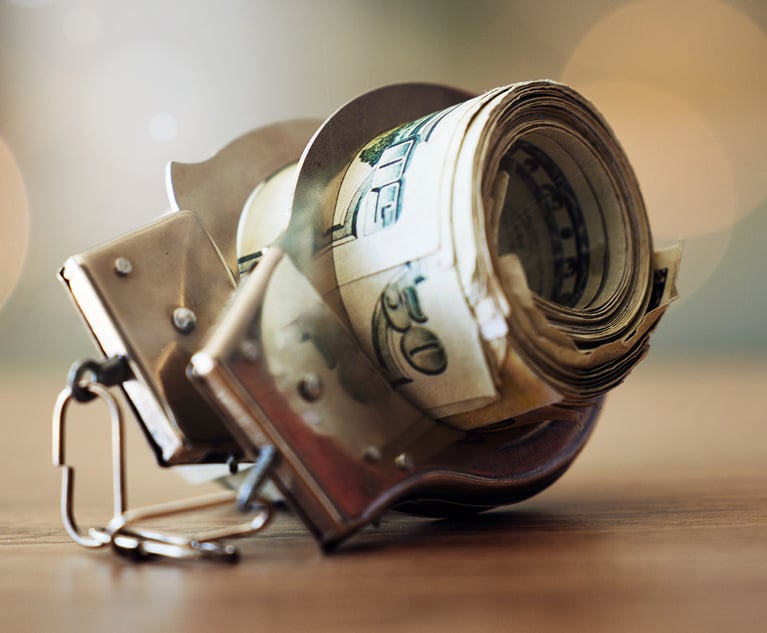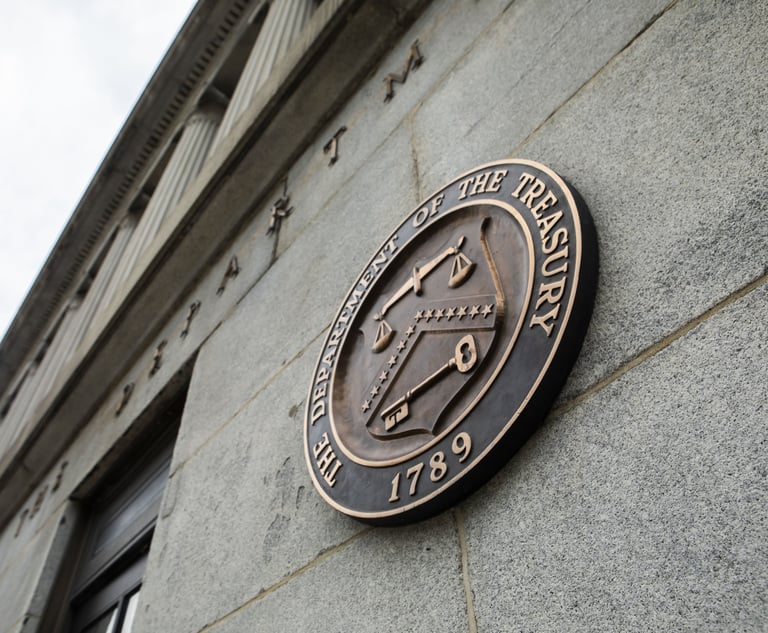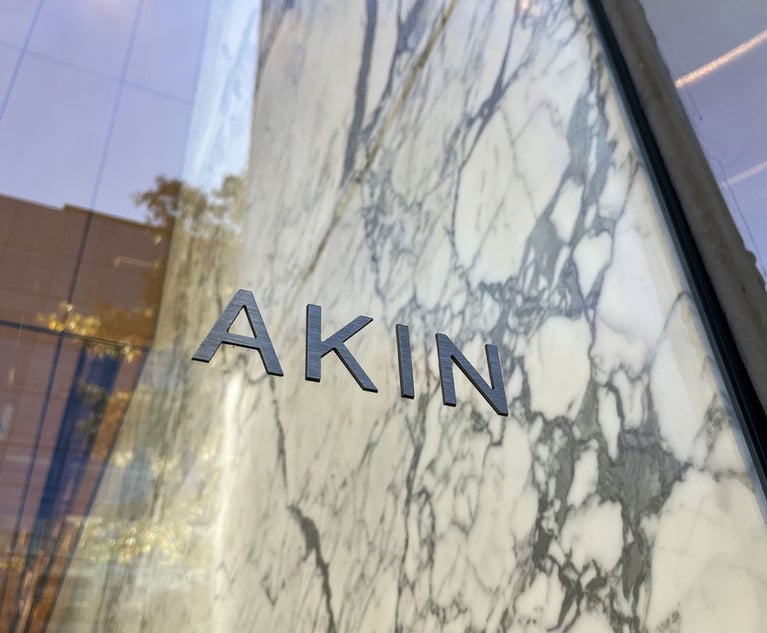Lawyer Convicted of Crimes Related to a Diamond Resell Scheme Facing Disbarment
The Commission for Lawyer Discipline is seeking to disbar a Houston solo who was convicted of crimes related to a scheme that purported to take investors' money to buy and sell diamonds, but really used the funds for other, concealed purposes.
August 23, 2018 at 03:36 PM
5 minute read

The Commission for Lawyer Discipline is seeking to disbar a Houston solo practitioner who was convicted of crimes related to a scheme that purported to take investors' money to buy and sell diamonds, but really used the funds for other concealed purposes.
Christopher Jiongo pleaded guilty and was convicted of wire fraud and aiding and abetting, which is an intentional and serious crime and deserves disbarment, the commission alleged in a compulsory discipline petition to the Texas Board of Disciplinary Appeals. The board is set to hear the case in October.
Jiongo is unavailable for comment because he is currently incarcerated in the Federal Correctional Institution in Beaumont, according to the Federal Bureau of Prisons inmate locator. He's got a projected release date in 2021. He's serving four years and 10 months in prison, followed by two years of supervised release, and was also ordered to pay $3.79 million in restitution.
Claire Mock, a spokeswoman for the State Bar of Texas Office of Chief Disciplinary Counsel, which represents the Commission on Lawyer Discipline, didn't respond to an email seeking comment before deadline, and neither did the federal public defenders who represented Jiongo in his underlying criminal case.
Jiongo earned his law degree from Southern Methodist University Dedman School of Law in 1987 and was licensed in Texas the same year. He was also licensed in New Jersey and Pennsylvania. His State Bar of Texas profile said that he practiced in the areas of business, international, securities law and finance. He doesn't have a public disciplinary history, but he's currently administratively suspended from practicing law, which can happen if a lawyer doesn't pay dues or taxes, doesn't comply with continuing education rules, defaults on student loans, or other things.
The superceding indictment in United States v. Otteson, filed in the U.S. District Court for the Northern District of Texas, explains the allegations against Jiongo, who was one of three co-defendants.
The two other co-defendants were involved in a Dallas business called Worldwide Diamond Ventures, which starting in 2011 was selling “nonrecourse promissory notes” to investors for $50,000 per note. Jiongo was an officer who formed another company, Global Reach, in 2011.
Jiongo and his co-defendants in March 2011 hired three outside companies to market and sell the diamond notes—Jiongo drafted them—to raise the start-up funds. Each $50,000 diamond note had a nine-month maturity date and promised 8 percent interest. They initially raised $5 million from new investors from March to June 2011, alleged the indictment.
However, they realized their original business plan—of using investors' money to buy and sell diamonds—had failed because they couldn't buy and sell the diamonds on the market as planned.
They started deceiving investors, claimed the government, saying they were using the funds for diamonds and that the diamond notes were fully secured by diamonds and cash. Really they knew the funds weren't fully secured and they hid the fact they used the money for other things like $300,000 for unauthorized loans to business friends, some of which bought cars. Another loan of $1.45 million went to a third party who promised a future purchase of gold and diamonds, but never delivered, the government claimed. A loan of $1 million went to Jiongo's business, Global Reach, for a start-up insurance company.
When an investor's diamond note matured in nine months, rather than paying back the $50,000 plus interest, the defendants would encourage the investor to renew the note. They paid interest, but that money didn't come from the profits of diamond sales, like it was supposed to, but instead from new investors' funds, said the indictment.
The first round of 57 investors invested $5.01 million in the scheme. The second round of 20 investors put in $1.46 million. In a final round, 77 investors invested $6.47 million. Because of the scheme, the investors lost a total of at least $4.86 million, the indictment alleged.
Regarding the $1 million loan from Jiongo's company Worldwide Diamond to Global Reach, the government alleged in the indictment that Jiongo sent $630,000 total into his lawyer's trust account at a Dallas bank and then transferred funds to third parties. One of those funds transfers was the subject of count 2 of the indictment, which is the wire fraud aiding and abetting count to which Jiongo pleaded guilty. It involved a $100,000 wire transfer of funds from Jiongo's trust account to an outside company.
He entered a plea agreement on April 25, 2017, agreeing to plead guilty to that specific count of wire fraud and aiding and abetting, if the government would dismiss the other charges in the indictment against him. The dismissed charges included two additional counts of wire fraud and aiding and abetting, one count of conspiracy to commit wire fraud, and five counts of mail fraud aiding and abetting.
Angela Morris is a freelance journalist. Follow her on Twitter at @AMorrisReports
This content has been archived. It is available through our partners, LexisNexis® and Bloomberg Law.
To view this content, please continue to their sites.
Not a Lexis Subscriber?
Subscribe Now
Not a Bloomberg Law Subscriber?
Subscribe Now
NOT FOR REPRINT
© 2025 ALM Global, LLC, All Rights Reserved. Request academic re-use from www.copyright.com. All other uses, submit a request to [email protected]. For more information visit Asset & Logo Licensing.
You Might Like
View All
Bracewell Adds Former Pioneer Natural Resources Lawyer to O&G, Energy Transition Practices
2 minute read
Ex-Jenkens & Gilchrist Lawyer Convicted in Tax Shelter Scheme is Among Biden's Commutations
3 minute read
Corporate Disclosure Law Enjoys ‘Presumption of Constitutionality,’ Feds Tell Justices

Trending Stories
Who Got The Work
Michael G. Bongiorno, Andrew Scott Dulberg and Elizabeth E. Driscoll from Wilmer Cutler Pickering Hale and Dorr have stepped in to represent Symbotic Inc., an A.I.-enabled technology platform that focuses on increasing supply chain efficiency, and other defendants in a pending shareholder derivative lawsuit. The case, filed Oct. 2 in Massachusetts District Court by the Brown Law Firm on behalf of Stephen Austen, accuses certain officers and directors of misleading investors in regard to Symbotic's potential for margin growth by failing to disclose that the company was not equipped to timely deploy its systems or manage expenses through project delays. The case, assigned to U.S. District Judge Nathaniel M. Gorton, is 1:24-cv-12522, Austen v. Cohen et al.
Who Got The Work
Edmund Polubinski and Marie Killmond of Davis Polk & Wardwell have entered appearances for data platform software development company MongoDB and other defendants in a pending shareholder derivative lawsuit. The action, filed Oct. 7 in New York Southern District Court by the Brown Law Firm, accuses the company's directors and/or officers of falsely expressing confidence in the company’s restructuring of its sales incentive plan and downplaying the severity of decreases in its upfront commitments. The case is 1:24-cv-07594, Roy v. Ittycheria et al.
Who Got The Work
Amy O. Bruchs and Kurt F. Ellison of Michael Best & Friedrich have entered appearances for Epic Systems Corp. in a pending employment discrimination lawsuit. The suit was filed Sept. 7 in Wisconsin Western District Court by Levine Eisberner LLC and Siri & Glimstad on behalf of a project manager who claims that he was wrongfully terminated after applying for a religious exemption to the defendant's COVID-19 vaccine mandate. The case, assigned to U.S. Magistrate Judge Anita Marie Boor, is 3:24-cv-00630, Secker, Nathan v. Epic Systems Corporation.
Who Got The Work
David X. Sullivan, Thomas J. Finn and Gregory A. Hall from McCarter & English have entered appearances for Sunrun Installation Services in a pending civil rights lawsuit. The complaint was filed Sept. 4 in Connecticut District Court by attorney Robert M. Berke on behalf of former employee George Edward Steins, who was arrested and charged with employing an unregistered home improvement salesperson. The complaint alleges that had Sunrun informed the Connecticut Department of Consumer Protection that the plaintiff's employment had ended in 2017 and that he no longer held Sunrun's home improvement contractor license, he would not have been hit with charges, which were dismissed in May 2024. The case, assigned to U.S. District Judge Jeffrey A. Meyer, is 3:24-cv-01423, Steins v. Sunrun, Inc. et al.
Who Got The Work
Greenberg Traurig shareholder Joshua L. Raskin has entered an appearance for boohoo.com UK Ltd. in a pending patent infringement lawsuit. The suit, filed Sept. 3 in Texas Eastern District Court by Rozier Hardt McDonough on behalf of Alto Dynamics, asserts five patents related to an online shopping platform. The case, assigned to U.S. District Judge Rodney Gilstrap, is 2:24-cv-00719, Alto Dynamics, LLC v. boohoo.com UK Limited.
Featured Firms
Law Offices of Gary Martin Hays & Associates, P.C.
(470) 294-1674
Law Offices of Mark E. Salomone
(857) 444-6468
Smith & Hassler
(713) 739-1250






